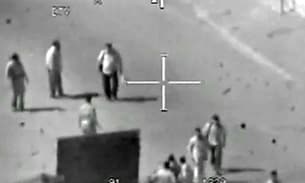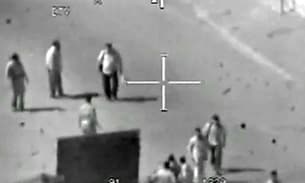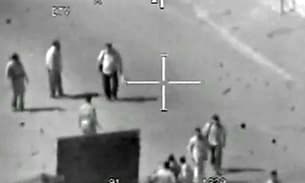
Murder in the dark? New claims of war crimes in Iraq come to light
The new Justice and Security Bill could keep claims of torture and misconduct in the dark. (image from www.shutterstock.com)
New claims of war crimes perpetrated by British soldiers against Iraqi civilians will be officially brought to the attention of the Ministry of Defence today. Meanwhile questions are being asked as to why the UK’s top legal personnel in Iraq were left unaware of several ‘black op’ jails in the country, and the possible rendition of Iraqi prisoners.
A report by the Mail on Sunday has revealed up to four ‘black sites’ which may have housed the torture of Iraqi prisoners during the Iraq war.
The newspaper also reports the personal testimony of three Iraqi civilians, which has provided more evidence of military misconduct during the Iraq invasion.
Prisoners tell of being hooded, beaten, stripped and interrogated by British troops. One prisoner, a civilian lorry driver, claims he was pulled over, hooded and taken to ‘Station 22’, a ‘black op’ prison set up in a phosphate plant. There he was interrogated about weapons of mass destruction. When he told soldiers he did not have any information he was allegedly kicked so hard that two of his ribs broke. He was held for three weeks before being released.
In another instance a prisoner is reported to have died in British custody. A leaked RAF report documents the transporting of 64 Iraqi prisoners, on a Chinook aircraft, to another unofficial prison. One prisoner, an odd-job man named Tariq Sabri, was reportedly kicked to death while on the flight. There was an official investigation but not a post mortem. Mr Sabri was buried in the desert.
The remaining 63 prisoners were taken to an oil pumping station known as ‘H1’. According to the Mail on Sunday there is speculation that some of the prisoners may have been ‘rendered’ to a US prison outside Iraq.
It is thought there may be at least two more black op sites yet to be documented.
International crimes
Given that these events took place during the invasion of Iraq by British and US troops, they could constitute war crimes as outlined in international law.
‘Station 22’ the second of the camps named by the Mail on Sunday, was not registered with the Red Cross, thus contravening the Geneva Conventions.
The Geneva Conventions and their Additional Protocols lay out strict rules for the treatment of political prisoners, as well as civilians during war. Many of the interrogation techniques allegedly used by the British troops break these rules.
Phil Shiner, of Public Interest Lawyers, plans to bring legal action on behalf of some of the victims. Today he will send a letter to the Ministry of Defence demanding a full investigation and a public inquiry. If the MoD does not follow up on his request he plans to file a claim for a High Court judicial review.
Shiner previously worked with the Bureau on the Iraq War logs, a thorough analysis of US military documents leaked by Wikileaks.
Read the Bureau’s work on the Iraq War Logs here.
Lieutenant Colonel Nicholas Mercer, the chief British Army lawyer in Iraq during the 2003 invasion, told the Mail on Sunday, ‘The allegations are blatant violations of the Geneva Conventions and UN Convention Against Torture. If indeed prisoners were rendered beyond Iraq’s borders, then this is potentially one of the most serious war crimes under the Rome Statute.’
Questions remain as to why Lieut Col Mercer, as the top-most military lawyer in the country, was left unaware of the goings on of potential war crimes being committed at the black sites. It is understood that rather than following the usual chain of command, intelligence about the sites was passed on to MoD legal advisers based in the UK.
Secrecy Bill
However questions such as those raised above could well be silenced in the future. A new bill, currently making its way through parliament, would ensure that cases involving military secrets, including allegations of misconduct and torture, would never see the light of day.
The Justice and Security Bill which received its second reading in the House of Lords last week, would ensure that evidence such as that brought by Mr Shiner, would remain hidden. The Bill would allow the government to withhold information it deemed ‘sensitive’ in civil court cases.
The Bill was introduced in the House of Lords, rather than the House of Commons. According to the Mail on Sunday MI5 Director-General Jonathan Evans has been lobbying politicians, pushing for the Bill.
Conservative MP David Davis is quoted in the Mail on Sunday as saying that the Bill appears to be ‘tailored to produce a cover-up.’
Read the original article in the Mail on Sunday here.




